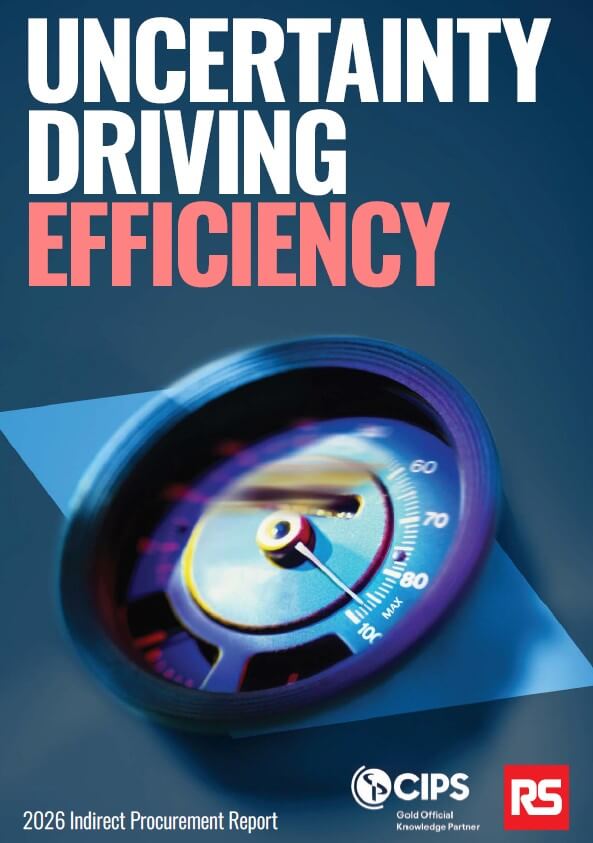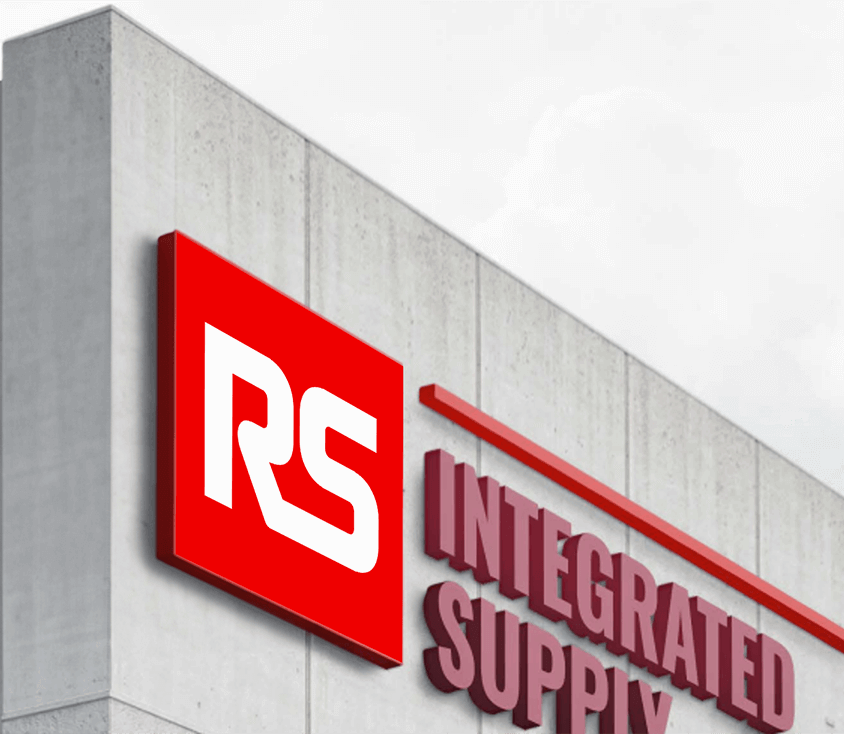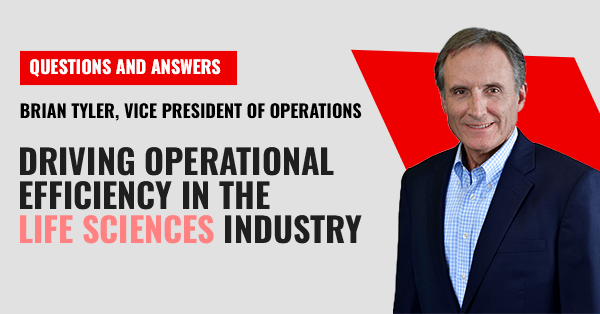Topics Covered
- What do these cost reduction opportunities look like?
- Are the demands of life sciences different to other industries?
- Can you share any other examples of how life sciences organizations benefit from an integrator’s expertise?
- Looking to the future, what will dominate the relationship between life sciences organizations and integrators in the years ahead?
- Other Related Questions
Tags
Published on
Read time: 8 minutes

Vice President for Operations, Brian Tyler, has worked with RS Integrated Supply’s life sciences clients for many years. In this interview, he shares his insights into how integrated supply helps large manufacturers in this sector and others to operate more efficiently.
Let’s start at the beginning of the relationship between a life sciences organization and an MRO integrator. What are these businesses looking for when they outsource this function?
Our life sciences customers use us in a couple of ways. One is to manage their inventory and their storerooms, to provide a service so items are available when needed. We also do the sourcing for those items, looking for the right suppliers to secure the parts from. Those are the main functions, but we get involved with a lot of on-site activities too, such as setting up kitting to help them prepare for planned maintenance shutdowns.
More broadly they’re looking for a partnership with an organization that can provide value, which is mainly about plant reliability – that’s the number one goal. They want reliable plants, so the MRO services we provide must deliver that. At the same time, they’re looking for cost reduction opportunities.
What do these cost reduction opportunities look like?
It could be a straight piece price saving or it could be cost avoidance. For example, if we help them to adjust their reorder point so instead of buying 10 of one item, they’re now only buying five and stocking five, they’re avoiding the cost of carrying that additional inventory.
Process improvements are a big part. How can we improve their maintenance teams’ wrench time, so their end-users have more time to spend working on the equipment versus coming to get parts or trying to find and secure parts? They want to leave those parts of the process up to us.
Kitting also helps with driving up wrench time. If they’re doing a project, whether it’s a full plant shutdown or scheduled preventative maintenance, if they know the parts they’re going to need then we can make sure we have them available and ready to go at the right time. We can put it all together so when they pick it up, they pick it all up at once instead of having to come back and forth. That’s definitely a wrench time improvement.
It sounds like they’re looking for an integrator that can really add value.
Yes, they are. They want a partner that offers solutions, not just sells them parts. A lot of the time, the job is about buying from the right suppliers and showing savings, but it’s also about helping them to look at their processes and look at opportunities to use technology.
Because it’s about being a partner for any kind of issue they have, we like to be involved in their daily huddle meetings where they’re talking about what their day is going to look like. That way we can better understand what kind of challenges they may be facing and, based on our experience and knowledge of the business, offer solutions.
Are the demands of life sciences different to other industries?
Yes and no. There are similarities that are consistent across different industries. Large manufacturers in other sectors are also looking for plant reliability because downtime is expensive – and everyone wants to lower costs. Some of the differences include the level of regulation from bodies such the FDA [the US Food and Drug Administration] and GMP [Good Manufacturing Practices] compliance for cleanroom type environments.
Our life sciences clients rely on us to be a partner that can work within and help them to make improvements in these types of settings. For example, with cleanrooms, you must be fully gowned up, masked and sometimes wearing a respirator to enter. Coming in and out of these cleanrooms is a time-consuming process and there’s lots of PPE involved. As staff can’t just walk in and out of these spaces, we help them to improve the process of getting the materials they need the first time, so they don’t have to come out again for another part.
In some cases, we’re able to install vending machines containing certain items inside the cleanroom or just outside so they have products in more convenient locations, and they don’t have to spend as much time going back and forth. In another case, we re-located an entire MRO storeroom to within the cleanroom, leading to a 65-percent reduction in travel time for technicians. Again, it’s about improving wrench time by improving access to inventory.
Can you share any other examples of how life sciences organizations benefit from an integrator’s expertise?
The main thing is making sure we have the right products for them, especially highly regulated items: making sure we are buying from the right suppliers and buying quality products that meet their needs. It’s also about ensuring we have the products when they need them: the right stock levels, based on usage. That’s a big one too.
Technology is important as well, whether that’s barcoding-type technology or developing AI to analyze data better and more efficiently. There is a lot of new technology out there that we’re looking at that can help things. Another benefit is that we help them to identify their own parts better. We improve the quality of the descriptions, and the manufacturer names and part number, so they can really understand what they’re buying.
Finally, having the experience of working with multiple life sciences clients and clients in other industries all over North America and elsewhere in the world allows us to determine best practices and bring those in. That’s another benefit.
Looking to the future, what will dominate the relationship between life sciences organizations and integrators in the years ahead?
These are large global companies that are constantly developing new products. There’s always research and development and they’re always looking for the next thing to improve their products. There’s also a lot of pressure on them to reduce the cost of their products – and they’re under a lot of pressure to find great new products but at lower costs.
That’s where RS Integrated Supply comes in: as companies try to drive down their costs of production, they’re looking for us to help them on the MRO side. How do we keep costs low and improve efficiency?
When you talk to these companies about reducing costs, everything is in scope. They’re really open to new ideas, whatever they might be. They want us to right-size their inventory. They want us to provide new technology. They want us to look at process improvements and continuous improvement opportunities.
It is no longer just a piece price play. They’re looking for us, they’re challenging us, to look at all types of cost improvement opportunities. They are very interested in learning how we can operate differently and more efficiently to continue to reduce costs. It’s a dynamic area to be working in and we have to continue to look at what we can offer them, from technology to what the stores of the future should look like.
Other Related Questions
MRO optimization refers to streamlining maintenance, repair, and operations processes to improve plant reliability, reduce downtime, and control costs. It is especially critical in regulated environments like pharmaceutical manufacturing, where lost production due to lack of spare parts can cause disruption in delivering important medications and supplies.
Integrated supply helps manufacturers right-size inventory, reduce carrying costs, and ensure critical parts are available when needed, often through cycle counting, supplier consolidation, and usage-based stocking strategies. By accurately tracking parts usage or consumption, companies are able to stabilize the MRO spend and identify savings opportunities.
Wrench time measures the actual time maintenance teams spend working on equipment. Improving wrench time through better parts availability and kitting directly boosts operational efficiency and reduces production delays. It means technicians are spending less time searching for or requesting parts and more time actually repairing equipment.
Technologies like barcoding, AI-driven analytics, and digital part identification (e.g., SnapPart™) enhance inventory accuracy, streamline procurement, and support compliance in highly regulated environments.
Cleanrooms require strict access protocols and PPE, making part retrieval time-consuming. Integrated supply solutions like in-room vending or storeroom relocation help reduce travel time and improve reliability. It’s the difference between having to go get a specific part and having it nearby when required. That translates to less PPE materials used and more efficient maintenance.
Outsourcing to an experienced integrator provides access to best practices, supplier networks, and process improvements that drive cost savings, compliance, and operational consistency.
RSIS ensures that parts meet regulatory standards, are sourced from approved suppliers, and are available in ways that support cleanroom protocols and validated processes.
Yes, RS Integrated Supply tailors its solutions based on facility layout, production needs, regulatory requirements, and existing systems to maximize efficiency and reliability. Each location or client is different, and the solutions need to reflect that.





